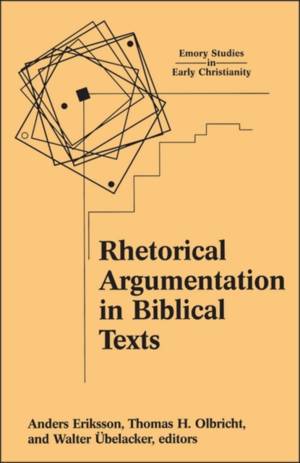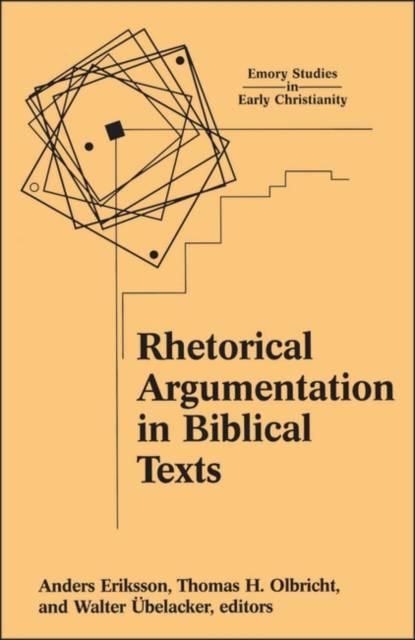
- Afhalen na 1 uur in een winkel met voorraad
- Gratis thuislevering in België vanaf € 30
- Ruim aanbod met 7 miljoen producten
- Afhalen na 1 uur in een winkel met voorraad
- Gratis thuislevering in België vanaf € 30
- Ruim aanbod met 7 miljoen producten
Zoeken
Rhetorical Argumentation in Biblical Texts
Essays from the Lund 2000 Conference
€ 203,95
+ 407 punten
Omschrijving
In the latest volume in the Emory Studies in Early Christianity series, the contributors seek a better understanding of how various biblical authors present their arguments, support their claims, and attempt to persuade their readers. A century ago the rhetorical analysis of texts focused on the study of rhetorical figures in texts (elocutio). In the mid-twentieth century, scholars such as James Muilenburg, Hans Dieter Betz, and Wilhelm Wuellner introduced biblical scholars to the illustrious tradition of rhetorical study. These scholars tended to focus on the arrangement of the texts themselves (dispositio). During the last ten years, however, interpreters have increasingly studied the rhetorical argumentation in texts. The authors in this volume examine rhetorical argumentation in the Hebrew Bible, the Gospels, the Pauline letters, and the Book of Revelation, offering striking new readings of these materials. Contributors include: J. David Hester (Amador), Center for Rhetoric and Hermeneutics; R. Dean Anderson, Valkenburg, The Netherlands; Harold W. Attridge, Yale Divinity School; L. Gregory Bloomquist, St. Paul University, Ottawa; Michael R. Cosby, Messiah College; Rodney K. Duke, Appalachian State University; Frans H. van Eemeren, University of Amsterdam; Anders Eriksson, Lund University; Alan J. Hauser, Appalachian State University; Roy R. Jeal, William and Catherine Booth College; Manfred Kraus, Eberhard-Karls-Universit+ñt, T++bingen; John W. Marshall, University of Toronto; Roland Meynet, Pontificia Universit+á Gregoriana; Thomas H. Olbricht, Emeritus, Pepperdine University; Carol Poster, Florida State University; Rollin A. Ramsaran, Emmanuel School of Religion; Vernon K. Robbins, Emory University and University of Stellenbosch; Russell B. Sisson, Union College; Jerry L. Sumney, Lexington Theological Seminary; C. Jan Swearingen, Texas A & M; Lauri Thur+¬n, Univeristy of Joensuu; Johan S. Vos, Vrije Universiteit; and Duane F. Watson, Malone College.
Specificaties
Betrokkenen
- Uitgeverij:
Inhoud
- Aantal bladzijden:
- 456
- Taal:
- Engels
- Reeks:
Eigenschappen
- Productcode (EAN):
- 9781563383557
- Verschijningsdatum:
- 1/06/2002
- Uitvoering:
- Paperback
- Formaat:
- Trade paperback (VS)
- Afmetingen:
- 154 mm x 228 mm
- Gewicht:
- 730 g

Alleen bij Standaard Boekhandel
+ 407 punten op je klantenkaart van Standaard Boekhandel
Beoordelingen
We publiceren alleen reviews die voldoen aan de voorwaarden voor reviews. Bekijk onze voorwaarden voor reviews.










